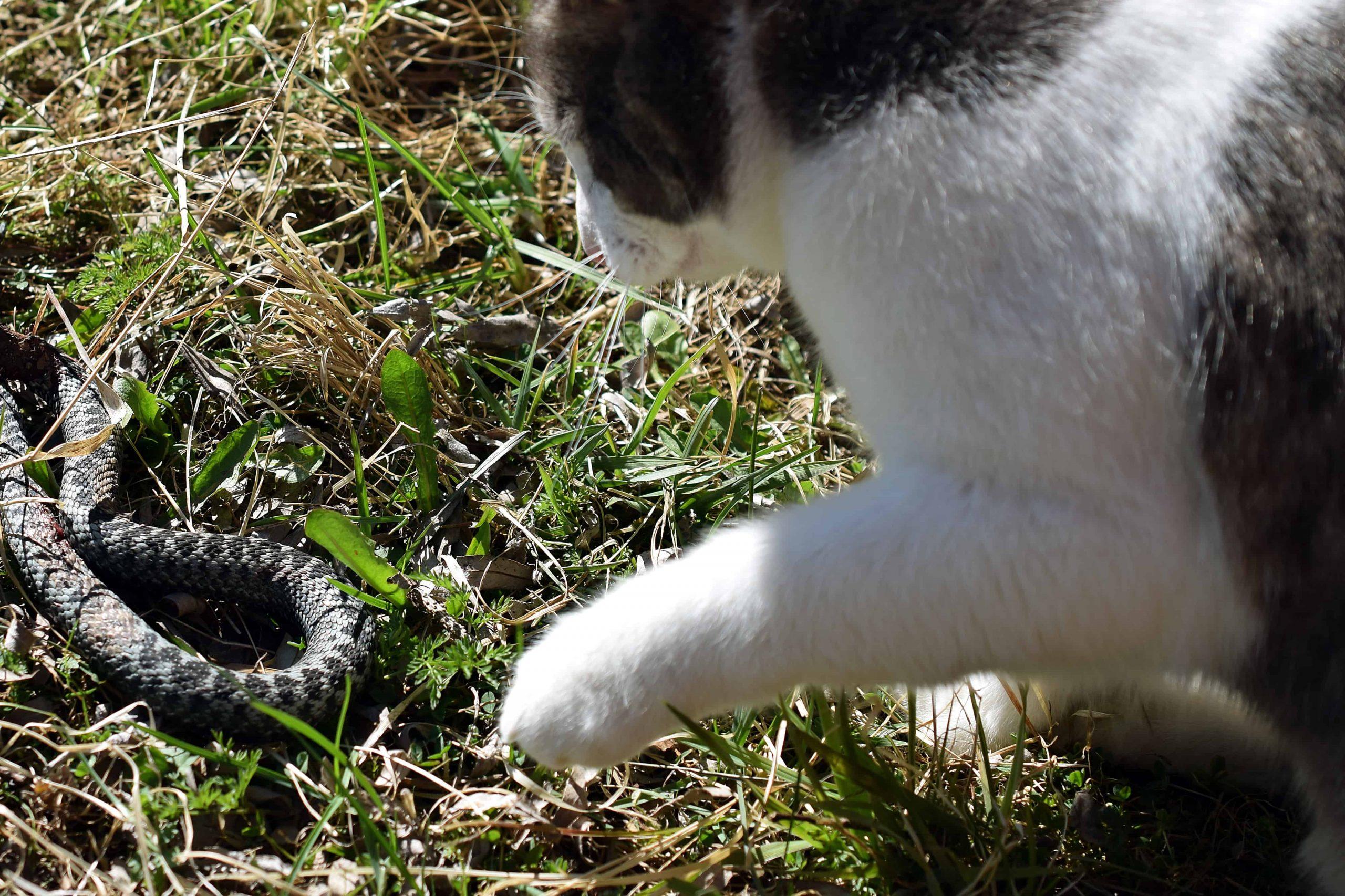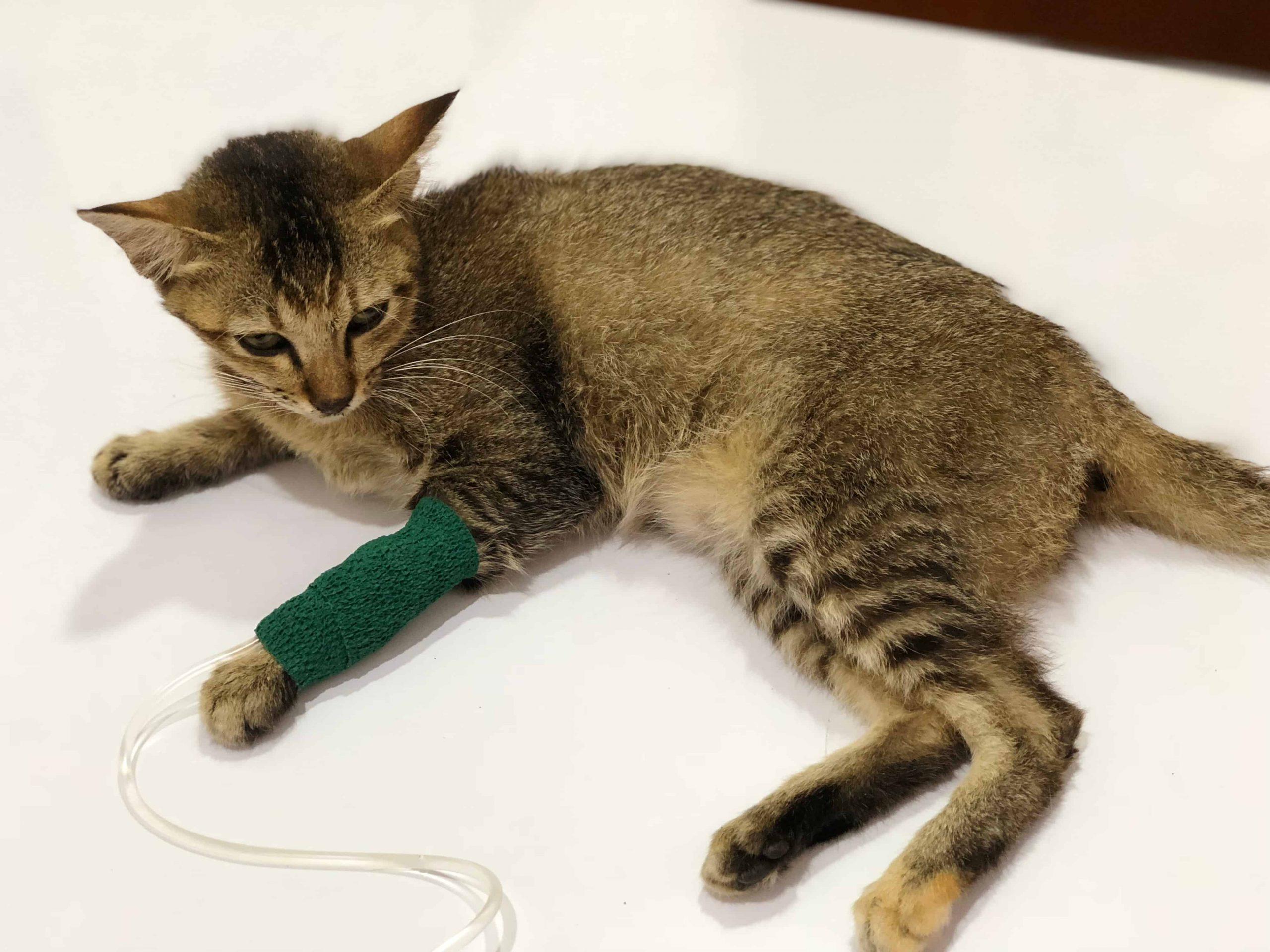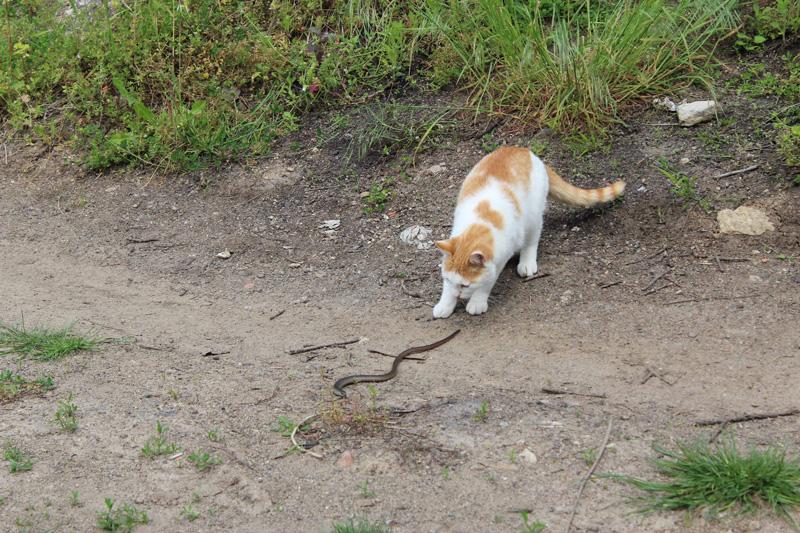As a natural hunter, your cat loves to chase anything that moves.
If she crosses paths with a snake, Fluffy probably won’t hold back!
In Australia, snake bites in cats occur even in the cooler months, but are more common between September and March when the mercury is higher.
Our nation holds the unenviable record of having the most venomous snakes. The eastern brown snake (second deadliest in the world) alone causes 76 per cent of snakebites in Aussie pets each year.
Many venomous bites are fatal or lead to serious health complications, such as kidney disease and organ damage.
Thankfully, there’s a saving grace:
Anti-venom medication can save your cat’s life and significantly reduce the long-term risks of envenomation (venom exposure).
But only if administered in time.
You must take your feline to the vet as soon as you suspect a snake bite has occurred.
Read on to find out what signs to look out for, how to help your sick cat, and what precautions you can take to prevent this from happening again.
Symptoms of a snake bite in cats
Felines usually don’t show symptoms straight away. It generally takes 15 to 24 hours for the first signs to show, after being bitten by a venomous snake.
Please be aware that each pet reacts differently to a snake bite, based on a number of factors – such as how much venom was injected. Not all signs will be present.
Take your cat to the vet straight away if they show any of these signs, EVEN IF there’s no obvious puncture mark.
- Weakness and lethargy
- Vomiting
- Diarrhoea
- Breathing problems
- Pale or blue-tinged gums
- Fast heartbeat
- Twitching or shaking
- Urine is tinged red or brown with blood
- Difficulty walking, poor coordination
- Excess drooling
- Bleeding wound
- Dilated pupils
- Blinking is challenging
- Drooping eyelids
- Altered vocalisation (their meow sounds different)
- High temperature
- Losing control of bodily functions
- Collapse
- Paralysis
- Coma

Health complications that may arise from venomous snake bites
The poison travels through the cat’s lymphatic system and can damage tissues, the nervous system and organs.
Let’s look at some of the long-term effects of snake bites in cats (more common in cases where treatment has been delayed):
- Renal problems, such as chronic kidney disease
- Permanent injury to the brain
- Cardiac arrest
- Organ failure
Venomous snake bites in cats can lead to death within 43 hours, if left untreated.
What to do if your feline is bitten by a snake
Your number one priority is to take your cat to the vet – while also making sure that you, your loved ones and other pets are protected from the snake. Keep everyone away from the area, if there’s any chance the snake could be hanging around.
Don’t try and identify the snake by getting close to it. You may want to take a picture from a distance, but only if it’s safe to do so.
Never try to capture or kill the snake, this is both dangerous and illegal. If you believe the snake is still on your property, call a professional snake catcher.
Call your vet or an emergency veterinary clinic to let them know that you’re on your way. Ask your vet if there’s anything that you can do to best prepare Kitty for the journey there.
Possible ways to help your cat:
- Keep him as calm and still as possible, to stop his heart rate from speeding up
- Remove the collar if it’s easy to do so without causing stress
- Try to stay calm yourself, remember that your cat’s chances of recovery are good if you seek veterinary assistance as soon as possible
- Depending on where the bite is, keep the area lower than the heart
- If possible, wrap the bitten area with a firm pressure bandage, to slow down the spread of the venom (not too tight though, you don’t want to restrict circulation).
- Do NOT: wash the wound, apply ice or alcohol, apply a tourniquet, try to suck the venom out, or let your cat walk.
- Even if you believe the snake is dead, don’t take it with you for identification! It could just be pretending. At any rate, its fangs are still filled with venom.

Diagnosis and treatment for snake bites in cats
The vet will thoroughly assess your cat upon arrival.
Sometimes a screening test (usually blood or urine) is required to determine if venom has been injected. In other cases, screening isn’t appropriate, especially if the patient is deteriorating quickly and needs treatment straight away.
A broad spectrum anti-venom (antivenin) is administered intravenously. This is generally suitable, even if the species hasn’t been identified.
Multiple doses may be required, depending on how much venom there is.
If your cat is struggling to breath due to severe envenomation, a ventilator may be required until the medication starts to work its magic.
The prognosis is good with early intervention. Many felines recover within a few days of receiving treatment. When you return home, be sure to keep a close eye on your cat and seek advice from your veterinarian if she doesn’t seem to be improving, or develops new symptoms.
Keep in mind that anti-venom medication isn’t a vaccination, it won’t protect Kitty from any snake bites that occur in the future. If this happens again, you will need to seek urgent veterinary care.
Precautions that may prevent snake bites in cats
Unless you keep your cat indoors 24/7 or live in an area where there are no snakes, there’s nothing you can do to completely protect your cat from getting bitten.
However, there are some precautions that could minimise the risks!
- Keep your backyard clean of items that attract and shelter snakes, such as big rocks, toys, tools, piles of wood, fallen logs and tall grass.
- If there are any holes in your backyard, fill them up.
- Don’t plant flowers and shrubs near walkways.
- Mow your lawn often!
- Keep firewood far away from the house.
- Don’t leave food, bird seed and garbage lying around – it may attract rodents that snakes love to feast on.
- If you have an outdoor compost system, make sure it’s set up in a way that doesn’t attract rodents. You may want to opt for a closed-bin or bokashi system that’s designed to deter rodents.

Potiki cat insurance for veterinary check-ups
Treatment for snake bites in cats is expensive.
Depending on the extent of the problem, expect to pay around $2000 for the vet consultation and treatment (a single dose of anti-venom medication costs at least $800).
You don’t have to worry about how you’re gvenoing to pay for this, with reliable pet insurance. Your policy would cover most of the costs, as this isn’t a pre-existing condition.
Potiki’s affordable pet insurance gives you that peace of mind, but we go one step further…
We also send you free Potiki Perks to help you take care of your beloved feline’s general wellbeing.
All customers get up to $400 worth of tailored essential pet supplies (like tick medication), as well as 24/7 access to an online chat service with experienced vets.
This is on top of reliable Potiki pet cover (via petinsurance.com.au) that pays for 80 per cent of your eligible vet bills for unexpected illness and injury.
- Get a quick Potiki quote to find out what your premium will cost for one year.
- Submit payment if you’re satisfied with that amount (email us on [email protected] with any questions).
- Log into your personal portal to select items for your Potiki Perks package, which will be swiftly delivered to you.
- Lodge a claim if you need help paying vet bills for unexpected sickness or injury.

